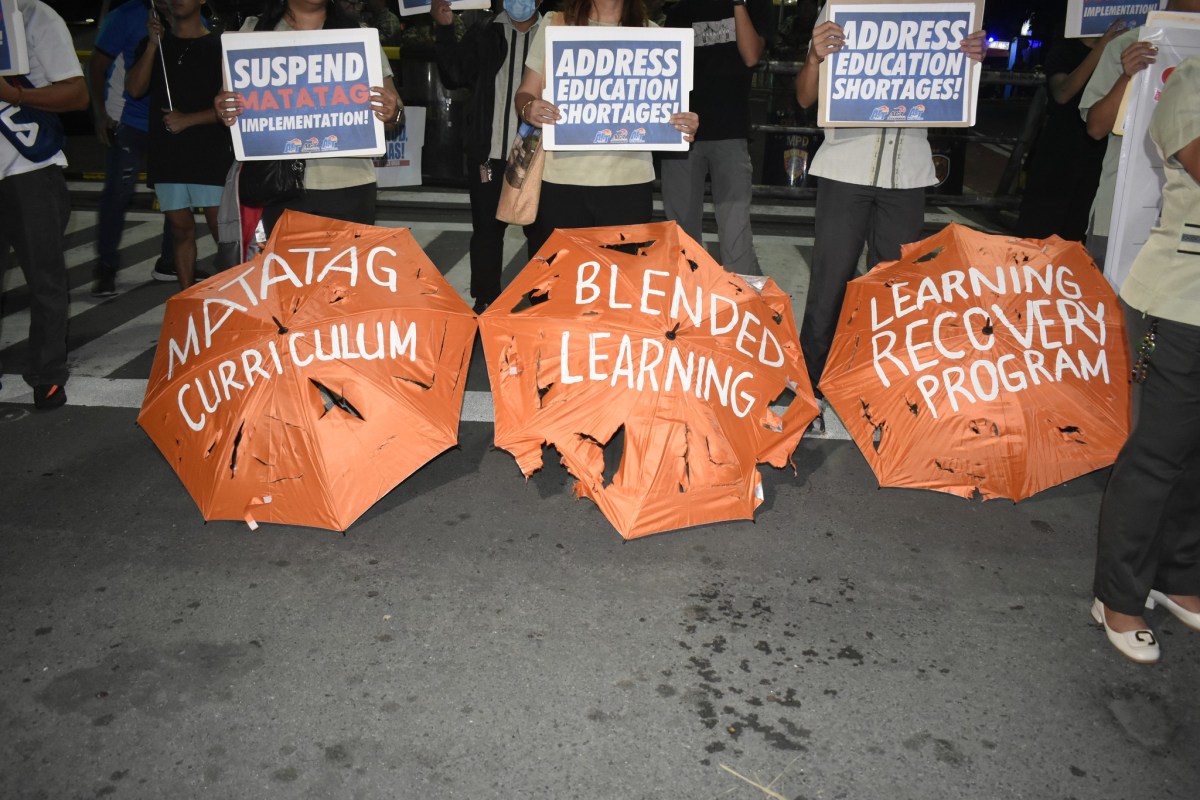
By DANIELA MAURICIO
Bulatlat.com
MANILA – Something old, something new. There is a reason to feel blue.
Same old problems greet teachers and students as the new school year 2024-2025 begins today, July 29.
According to Alliance of Concerned Teachers (ACT) Philippines, teachers and students do not only face a lack of classrooms but also the burden of implementing the new Matatag curriculum that will only add to the workload of teachers and students.
Lack of classrooms
The perennial problem of lack of classrooms is exacerbated by typhoon Carina (Gaemi) which resulted in the conversion of classrooms to evacuation centers.
“We have long advocated that schools should not be used as evacuation centers. While we understand the need to help our fellow citizens, for the sake of providing quality education, the government must provide separate evacuation centers instead of using our schools,” said Lorenz Aric Ancheta, vice president for high school of Quezon City Public School Teachers Association (QCPSTA).
In a press conference on July 27, Ancheta said that having designated evacuation centers will prevent disruptions in the students’ education.
“The opening of schools will inevitably be postponed and this is unavoidable. We don’t want students to face not only a lack of books and teachers but also mud and damaged equipment. This situation arises because our schools are not truly disaster-resilient,” Ancheta said.
As of July 28, the Department of Education (DepEd) said that there are 832 public schools nationwide that are expected to postpone their classes on July 29 due to the onslaught of typhoon Carina and the continuous rains. In the National Capital Region, at least 225 public schools are expected to postpone their classes on July 29.
Ancheta expressed dismay over Ferdinand Marcos Jr.’s remarks suggesting that classes could be held outside the classroom. “I thought we were striving for quality education? If quality education means holding classes outside the classroom, even when schools are affected, is this truly the quality of education we want?”
“It is disheartening that our president seems to be indifferent to the actual situation of our schools. We can’t just simply be told to ‘be at peace.’ As discussed frequently on social media, it’s not just about resiliency, we also need to demand accountability,” he added.
This school year, ACT said that there is a shortage of 159,000 classrooms.
ACT Teachers Partylist Rep. France Castro lamented the lack of budget in the education sector to address such problems.

Castro said that the recent damage from the typhoon worsened the classroom deficit, as many schools require rehabilitation and rebuilding. “The education budget,despite being the highest among government agencies, remains inadequate. It falls short of the recommended six percent of the gross domestic product (GDP), not even reaching five percent.”
She added, “Furthermore, there is a severe shortage of teachers, with some classes accommodating 50 to 70 students each, while the international standard is 35 students per class. To ensure quality education, it is crucial to adhere to the principle that ‘class size matters.’ This requires maintaining appropriate class sizes and having a sufficient number of educational and support personnel.” .
Former ACT Teachers Partylist Rep. Antonio Tinio shared the same sentiment. “The fundamental problems in our educational system remain unaddressed. We are struggling to keep up with the growing population and increasing school enrollment. Therefore, we urgently call for prioritizing the budget and focusing on hiring more teachers and the construction of more classrooms to address these pressing issues.”
Matatag curriculum
Erlinda Aquino, QCPSTA president, said that the Matatag curriculum “does not help improve the quality of education if our teachers are completely exhausted, especially with the additional workload brought by the Matatag curriculum. The same goes for the students in their studies. We are not robots.”
The Matatag curriculum, launched under Vice President and former DepEd Secretary Sara Duterte, aims to “produce competent, job-ready, active, responsible, and patriotic citizens.” It streamlines the original seven subjects into five key areas for students from Kindergarten to Grade 10 like language, reading and literacy, mathematics, nationalism, and good manners and right conduct. The curriculum will be piloted during the 2024-2025 school year for Kindergarten 1, Grade 1, Grade 4, and Grade 7.
According to Aquino, a survey of 3,679 respondents revealed that the implementation of the Matatag curriculum has increased teachers’ workloads by 30%, making their jobs more burdensome.
“With the reduced teaching time for each subject to 40 to 45 minutes, teachers are being pushed to their limits. By the end of the day, we are truly exhausted from the new schedule, which involves handling eight classes instead of the previous six. Those who designed this may not have tried teaching eight consecutive classes without a break because if they had, they would understand the strain we are under,” Aquino said in Filipino.
Jen Andraneda of ACT-NCR Union also noted that even before the school year begins, the education sector is already facing major challenges. As the Matatag curriculum is being rolled out for Kindergarten, other grade levels are also being subjected to new 45-minute teaching periods. Previously, the old curriculum allowed for one-hour periods. She said that these have been shortened to 45 minutes and teachers must adjust their lessons accordingly.
Andraneda said that the issue of teachers being assigned to teach subjects outside their areas of expertise, including the National Reading Program (NRP) and the National Math Program (NMP), to comply with the six-hour workday. She called for the halting of the implementation of the Matatag curriculum and overhauling the K to 12 system.
Tinio stressed that the curriculum’s effect on students is evident in the extended school hours, with dismissal now at 8:25 PM instead of the previous 6:00 PM.
Aquino said that the quality and safety of students are at risk. She criticized the DepEd for not providing printed workbooks or worksheets, leaving teachers to use their own money for materials. She said that the DepEd has only provided links for downloading resources, which adds to the teachers’ burden due to issues like acquiring ink and bond paper, and the lack of access to printers.
Blended learning not an option
Castro said that blended learning is still being implemented in some schools today, even though the country is no longer in the height of the COVID-19 pandemic. “Blended learning has proven to be ineffective. It has created learning loss, learning gaps, and an education crisis. Returning to blended or modular learning without addressing the shortage of classrooms and teachers is a mistake. This approach failed during the pandemic, and we are still trying to catch up with the learning loss and gaps among students.”
Castro added that if blended or modular learning is implemented, it will affect both parents and students. She stressed that not all parents have the capacity to tutor their children as they are already overwhelmed with economic challenges. (AMU, RTS, DAA) ![]()




